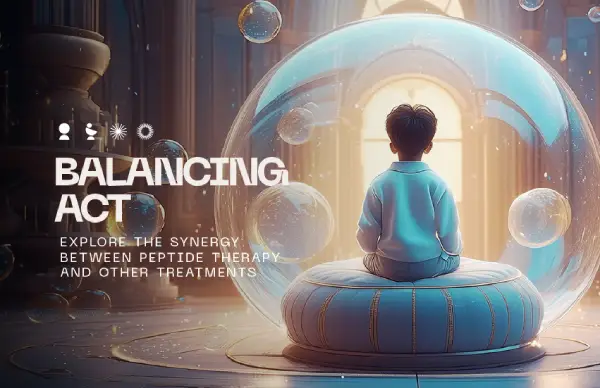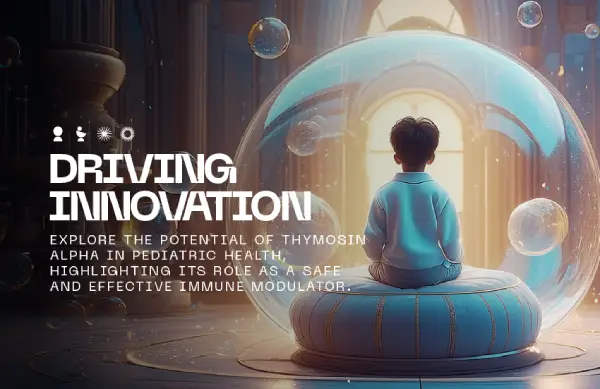Blog
Thymosin Alpha in Pediatrics: Are Peptide Therapies Safe for Children?

Contents
Thymosin alpha: Basics and functions
Current applications of thymosin alpha in pediatric health
Safety considerations
Regulatory landscape
Ethical considerations
Experts perspectives
Future research
A brighter future
Have you wondered if peptides are safe for children? What about the role of thymosin alpha in pediatrics? This is only one of over 60 approved for use.
Peptides have taken the world by storm. Each molecule has a range of benefits.
The well-being of your children is always uppermost in your mind. As a parent, you only want the best for them. This support includes ensuring proper healthcare.
Choosing a more natural remedy for healing has become very popular. Peptide therapy is one such option. Your body naturally creates these molecules for various physiological functions.
One peptide that plays a vital role in the immune system is thymosin alpha. As an immunomodulator, it boosts the efficiency of your natural defenses.
With an increase in peptide products for kids, is it safe to use thymosin alpha in pediatrics?
Let’s investigate this peptide and see how it can benefit children.
Thymosin alpha: Basics and functions
Thymosin alpha is an immunity peptide, also known as an immune modulator. It’s a hormone that the thymus gland produces. You’ll find this lymphatic organ between your lungs, behind the breastbone.
It forms part of both the lymphatic and the immune system. The role of the thymus gland is to make and train T cells. These are special white blood cells.
Once these leukocytes mature, they enter the bloodstream. They then travel to other areas of the lymphatic system. Here they help fight off infections and diseases.
The thymus gland starts functioning before birth. After puberty, it’s no longer active and has created all the T cells you’ll need. Thymosin alpha triggers these bacteria-fighting agents. Their job is to locate and destroy viruses and other disease markers.
This action improves the function of your immune system. Thymosin alpha (Tα1) is critical in controlling inflammation caused by chronic illnesses.
Tα1 has both antibacterial and antifungal properties. It can help protect your body against oxidative stress. It’s also believed to increase the effectiveness of vaccinations.
Can you use thymosin alpha in pediatrics?
This peptide has been effective in treating a few conditions in adults. The benefits include: alleviating symptoms of Lyme disease and chronic fatigue.
The following are potential benefits for pediatric treatments:
- Strengthening the immune system
- Increasing the effectiveness of vaccinations
- Eliminating unhealthy cells and stopping infection
- Suppressing the growth of tumors
In addition, it supports the body’s natural defenses against:
- HIV/AIDS
- Lyme disease
- Cancer, such as malignant melanoma
- Chemotherapy
- Hepatitis
- Autoimmunity
The research into these areas is ongoing, with no adverse side effects.
Current applications of thymosin alpha in pediatric health
In a 2018 study, researchers studied the efficacy of thymosin alpha in pediatrics. The investigation covered participants with severe pneumonia. The outcome was positive and showed that it significantly alleviated the symptoms.
It stimulated lung recovery and prevented inflammation. With many deaths relating to pneumonia, this is impactful.
This illness causes one fifth of deaths worldwide that result from diseases. It’s also the reason for the high mortality rate in minors.
Severe pneumonia greatly affects a child’s immune system. This is where thymosin alpha in pediatrics can be the most useful.
The researchers combined the peptide with regular treatment to manage the condition. It alleviated the symptoms. It also improved the levels of APC (activated protein C) and Interleukin-1R1 (IL-1R1).
In doing this, it prevented inflammation.
APC has anticoagulation effects while IL-1R1 regulates inflammatory responses. There were no adverse effects noted.
During the COVID-19 outbreak, many looked to thymosin alpha to treat this condition. The results of a study on its efficacy in COVID revealed that it can ease the symptoms.
It’s no surprise as it’s known to boost and strengthen the immune system. There was no research of the effects of thymosin alpha in pediatrics for coronavirus, as yet.
Peptides assist with weight loss and anti-aging. They also treat traditional diseases, like thymosin alpha.
Trial testing for tα1 as a treatment for cancer showed significant effects. These have not included pediatrics.
Safety considerations
Thymosin alpha can benefit a range of people. With its primary function being to boost your immune system, it’s safe for all ages.
This peptide is available in various forms. Some of these are easy to administer yourself. When obtaining thymosin alpha for pediatrics, first consult your doctor.
These professionals consider the age and medical history of your child. They then recommend an appropriate treatment.
You should use these molecules in conjunction with other treatments or lifestyle changes. They won’t cure a medical condition on their own.
Other peptides available for pediatrics haven’t shown any major side effects. When used under the guidance of a health professional, it’s considered safe.
Currently, you can find peptides in various forms safe for pediatric consumption. Some assist with children’s nutritional needs.
Health practitioners administer these treatments by injections, topical cream, inhalers, and capsules.
These are a few side effects experienced:
- Allergic reactions: These may occur when the patient is allergic to the peptide. The reactions may be; swelling, hives, or difficulty breathing.
- Hormone imbalance: Hormone replacement treatments can result in a hormone imbalance. This reaction can occur when not administered by a professional or incorrectly.
- Reactions to injection: The injection site may swell or become painful. These symptoms will vary depending on the individual.
- Interactions with other medication: Always inform your doctor of the medication you’re taking before commencing any treatment.
- Long-term effects: Peptides haven’t been in use for very long. There’s a lack of research when it comes to long-term effects.
A peptide supplement isn’t likely to cause any adverse effects. You still need to exercise caution to ensure your child’s safety.
There are certain stabilizing agents added to peptides. They might agree with adults but have an opposite effect on young ones.
Obtain these meds or treatments from reputable companies. It’s also advisable to stop using them when your child experiences any side effects.
When using a lotion or topical cream with peptide, there may be some sensitivity. This reaction could include itching or a rash.
Peptides taken orally haven’t displayed any real side effects. Like, with any medication, there’s always a possibility of a reaction.
There’s no developmental impacts of peptide in pediatrics recorded.
Regulatory landscape
The tα1 has only been FDA approved as Zadaxin. It treats the following conditions:
- Malignant melanoma: A more serious form of skin cancer. It’s mostly linked to genetics, personal characteristics, and UV exposure.
- Hepatitis B: A liver infection that can be chronic or acute. Zadaxin is a treatment for the more severe hepatitis B. This disease develops to the serious stage when the immune system can’t get rid of it.
- Hepatocellular carcinoma: This liver cancer occurs because of a chronic liver ailment, like hepatitis B.
- DiGeorge anomaly with immune defects: A syndrome that develops as a result of a missing chromosome 22. This condition causes poor body development. The impairments can include a cleft palate, a poor immune system, and others.
There’s currently no other thymosin alpha in pediatrics approved for use.
Ethical considerations
When giving a minor any medical treatment, there are a few ethical considerations. The following are a couple:
- Consent: Informed consent is vital with any medical treatment. Where the patient is a minor, the parent needs to give their permission.
Health professionals should make the parents aware of the nature of the therapy. The medical practitioner also needs to explain the potential risks and benefits.
- Long-term use: There’s currently no research data available on the impact of peptide use over a long period. It will be difficult for a parent to allow any treatment if they’re not fully aware of the long-term effects.
- Off-label use: Off-label use is when patients use an approved drug for an unapproved use. When the FDA approves a certain peptide, it will be for a particular use. Once it’s used for any other reason, it’s “off-label” use. Parents may regard this as unethical behavior.
Expert perspectives
Consulting a healthcare professional can help give you more insight into the specific condition.
Parents should follow the dosage directions and adhere to their advice.
Future research is crucial in the efficacy of thymosin alpha in pediatrics. It’ll uncover new applications and different approaches to this treatment.
Future research
Peptides have huge therapeutic value. Significant research has taken place over the years. It has successfully treated a wide range of diseases. It’s also used in aesthetic treatments.
Many people feel comfortable in using this safe and natural approach to their health. There’s great potential for this market to increase. Investments into this area of research seem positive.
Continuous support from the government and investors can increase COVID research. With the success of this treatment, there’s a need to make more of them available.
Phase 3 trial in hepatitis C is still in progress. The same applies to phase 2 in hepatitis B.
There are also efforts underway to improve oral availability. To make it more permeable for the GI tract.
A brighter future
Most peptide therapies are safe to use in pediatrics. Research in thymosin alpha’ safety is still lacking. This immune modulator plays an important role in the immune system. Something that all kids can benefit from.
The testing of this peptide through the years has found it to be effective. It assisted many with a range of diseases. Always consult a healthcare professional before starting any treatment.
At LIVV Natural we have a dedicated team of doctors to help you. In consultation with you, they will determine the best treatment plan to suit your child. Book a consultation to discover a unique health plan.
Author: Dr. Jason Phan NMD – Founder of LIVV Natural – Anti-aging – regenerative medicine – peptide therapy


